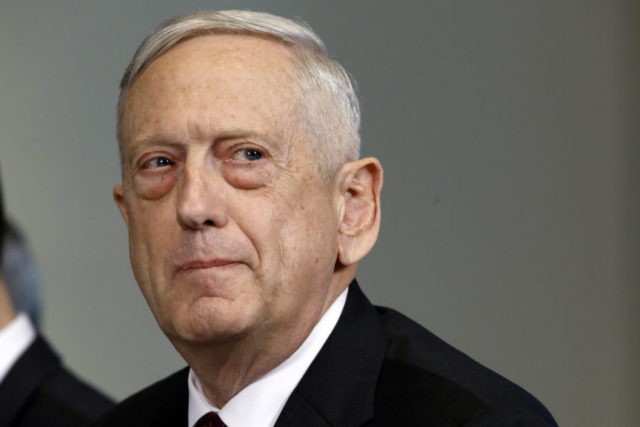Although Chinese media strove to portray Communist Party leader Xi Jinping’s meeting with visiting U.S. Secretary of Defense Jim Mattis as polite and productive, the condescending tone of its coverage paints a picture of Xi delivering a lecture on China’s sacred territorial rights while Mattis listened quietly.
The really interesting aspect of the secretary’s visit is that his own office has not told us much about what he said to Xi.
Granted, Mattis made a point of saying he had an open mind and open ears before he departed for China, but he also said he was traveling to Beijing for a “conversation.” Very little has been reported to date about his side of that conversation.
China’s state-run Xinhua news service quoted Xi’s comments at length while summarizing Mattis’ response as a general desire to work more closely with the Chinese military:
“When we see common interests between China and the United States, we do not shy away from differences,” the president said.
“Our stance is steadfast and clear-cut when it comes to China’s sovereignty and territorial integrity,” Xi said, adding that “any inch of territory passed down from ancestors can not be lost while we want nothing from others.”
As an important part of bilateral relations, Xi said military relations have maintained a sound development momentum in recent years.
“It has long been known that the real experts on military affairs do not want to employ military means to solve issues,” said Xi.
Xi noted that enhanced military exchanges and institutional building at various levels are helpful for defusing doubts and preventing misunderstandings, misjudgement, and accidents.
Xi said he hoped the two militaries will strengthen communication, increase mutual trust, deepen cooperation, manage and control risks and promote military ties to be a stabilizer of bilateral relations.
China’s Global Times likewise quoted analysts who buzzed about Xi’s momentous remarks but had very little to say about the defense secretary’s response:
“There are some issues concerning China’s sovereignty and territorial integrity which have become increasingly tense because of US moves,” such as South China Sea issues and the Taiwan question. “So, through the meeting, China is sending a warning to the US by reaffirming its bottom line,” Diao Daming, an American studies expert and associate professor at the Renmin University of China, told the Global Times.
Mattis has heard the most authoritative voice from China on these issues and questions, and this might indicate that China’s legitimate activities in regions like the South China Sea and the Taiwan Straits won’t be affected by military actions from the US, said Xu Guangyu, a retired PLA major general and senior adviser to the China Arms Control and Disarmament Association.
Mattis thanked Xi for meeting him and said that the US highly values the military-to-military ties with China, and the US is willing to strengthen strategic communication, expand win-win cooperation, control and manage differences and risks, and avoid conflict and confrontation with China, CCTV reported.
A similar tack was taken for Mattis’ meeting with Chinese Defense Minister Wei Fenghe, who was quoted delivering China’s positions on the South China Sea, Taiwan, and Korea by the Global Times, while not a word of response from Mattis was transcribed.
It is hard to berate the Chinese papers for minimizing Mattis when the official Department of Defense readout of the meeting says even less about the secretary’s remarks than Xinhua:
On June 27, 2018, in separate meetings in Beijing, Secretary of Defense James N. Mattis met with Chinese President Xi Jinping, Politburo Member Yang Jiechi, and Minister of National Defense General Wei Fenghe.
Secretary Mattis reaffirmed the importance of strategic transparency in the U.S.-China defense relationship. The leaders discussed a broad range of defense issues and reaffirmed the importance of the complete, verifiable, and irreversible denuclearization of North Korea.
Mattis is terse, but not shy, and he recently leveled some very strong criticism at Chinese militarization of the South China Sea. The day after he met with Xi, Mattis was making headlines in Seoul by promising America’s troop commitment to South Korea is “ironclad.” It is notable that DoD is allowing Xi to capture all the headlines by failing to spotlight anything Mattis said to him. It also leaves the impression that the meeting was a little frostier than anyone in either Beijing or Washington would like to admit.

COMMENTS
Please let us know if you're having issues with commenting.